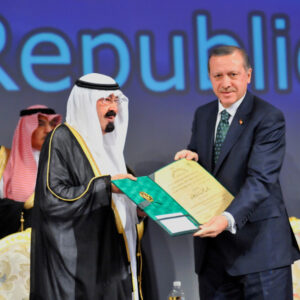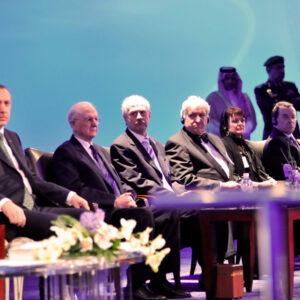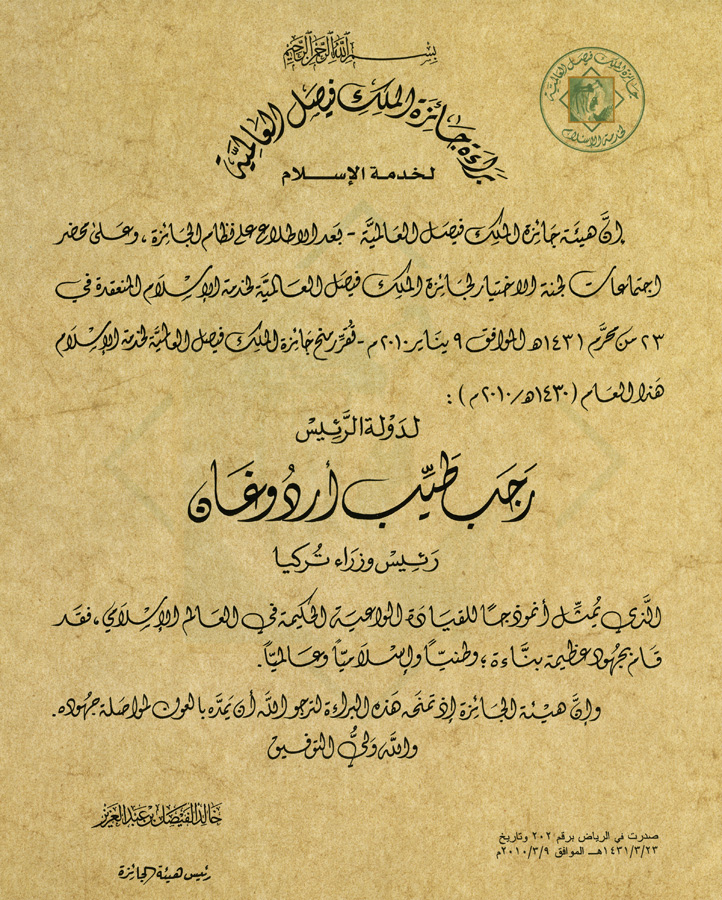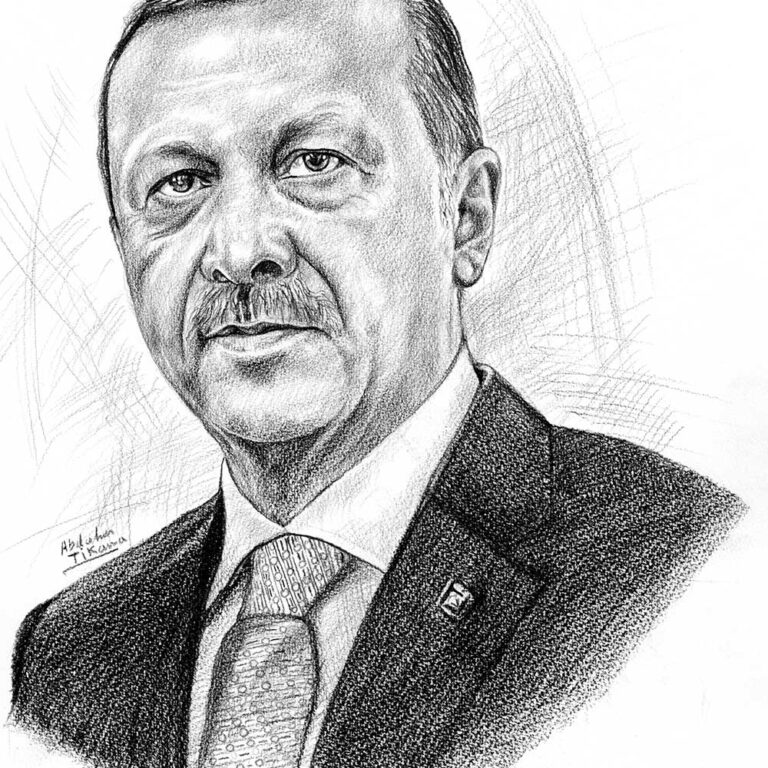
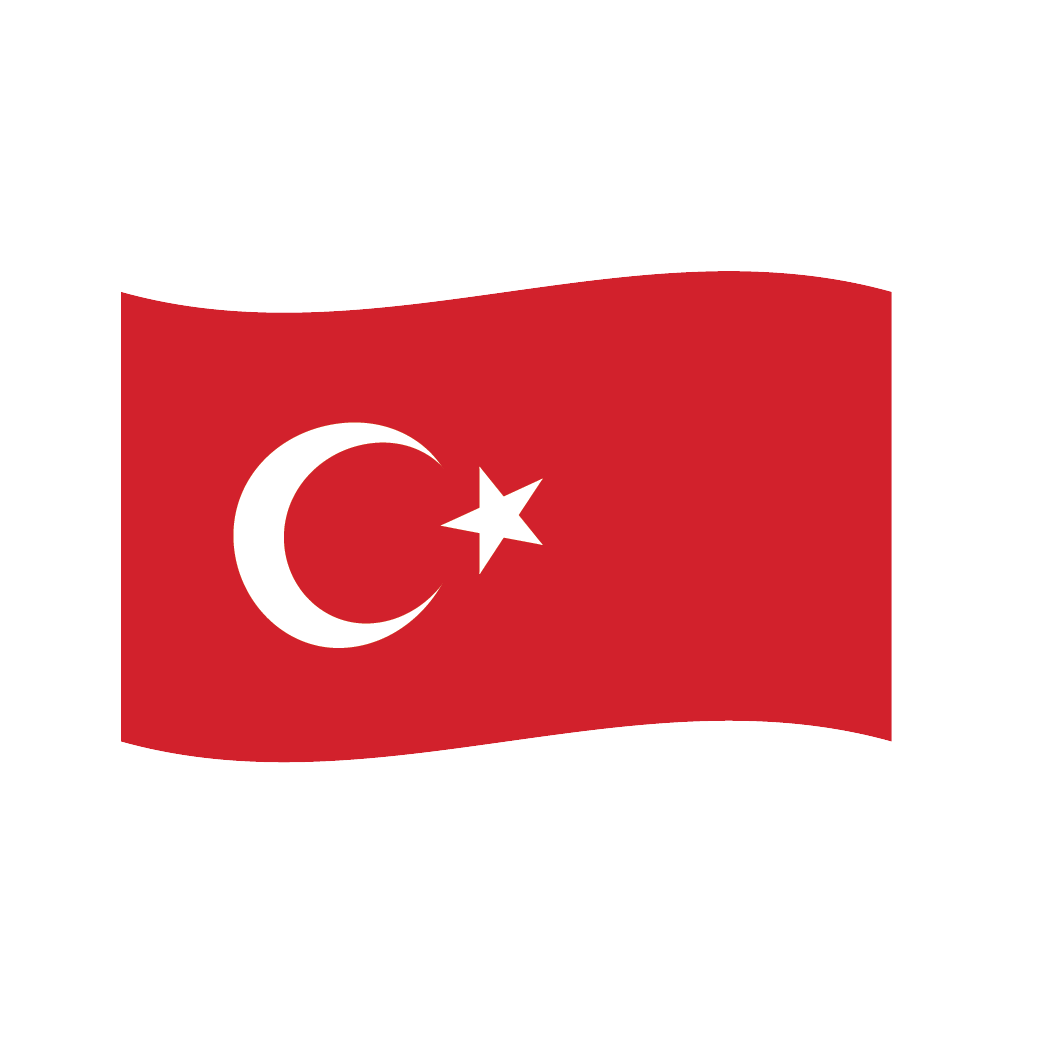
H.E. Recep Tayyip Erdogan
King Faisal Prize in Service to Islam 2010 Laureate
It is our duty to produce beautiful examples of the civilization of love and utter aloud the message of peace that constitutes the foundation of our civilization

Recep Tayyip Erdoğan’s grandfather died in the war with Russians and Armenians in 1916. His family moved from Batumi (now Georgia) to Rize, a coastal city on the Black Sea, where he spent his childhood. The family returned to Istanbul, where Erdogan grew up in Kasim Paşa, one of the poorest areas of Istanbul. During his elementary and intermediate school years, he sold lemonade, watermelons, and sesame buns on the streets of Istanbul in order to earn some income and assist his father. He received his high school education in Imam Hatip religious school, and obtained a degree in economics and business from Aksaray School of Economics and Commercial Sciences (now the Faculty of Economics and Administrative Sciences at Marmara University). As a youth, he played football in a local club which is currently named after him.
Prime Minister Erdogan’s political career started by joining the Welfare Party under the leadership of Necmettin Erbakan in the late 1970’s. In 1980, a military coup in Turkey banned all political parties. When parties were reinstated in 1982, Erdogan resumed his activities within the Welfare Party, which nominated him for the mayorship of Istanbul, winning a landslide victory over his opponents in 1994. During his tenure, he reversed Istanbul municipality’s debts and enhanced its economic development, raised workers wages, and provided better health and social care for the people. In 1995, he became the president of the Welfare Party’s branch in Istanbul, and was elected to the party’s Central Committee in 1996. In 1998, the Turkish Constitutional Court ruled that the Welfare Party was against the Constitution, shutting it down on grounds of threatening secularism in Turkey and banning its founder, Erbakan, from politics. Erdogan lost his job as mayor of Istanbul and became an active speaker in demonstrations held by the banned party’s supporters. He was convicted of violating Kemalism and imprisoned after reading poetry during a public demonstration, translated as: “The mosques are our barracks; the domes are our helmets; the faithful are our soldiers, and our army is the protector of our faith.” The judges also banned him from holding government posts and election to Parliament.
In 2001, Erdoğan formed the Justice and Development Party, which won the 2003 elections. This made it possible to amend the Constitution, thus enabling Erdogan to become Turkey’s Prime Minister on March 14, 2003. During his premiership, he set a remarkable example of judicious leadership in the Islamic world. His numerous accomplishments include a series of major economic, social and cultural reforms in Turkey that quickly established him as a statesman of enormous dimension, while his positions on various Islamic and global issues, particularly the rights of the Palestinian people, gained him admiration and respect throughout the Islamic world. During his premiership, Erdogan was able to lift his country from economic recession, reduce its debts, attract foreign investors and accomplish an economic growth of 7.3%. He was also able to introduce judiciary reforms and, particularly, a radical social security and health reform package whereby every one under the age of 18 will be entitled for free health care while the retirement age will be gradually increased to 65. In 2008, he introduced a law that prohibits all kinds of smoking in public areas. Erdoğan also instituted several democratic reforms, including major steps towards solving the chronic conflict with Kurds. He offered partial amnesty to Kurdish activists, allowed the use of Kurdish language in public media and restored original names of Kurdish cities and other Kurdish cultural rights.
In foreign policy, Prime Minister Erdogan succeeded in normalizing relations with Greece and signed an agreement with that country’s leaders to create a Combined Joint Operational Unit to participate in Peace Support Operations. He also took a series of successful steps towards reconciliation with Armenia and met numerous times with its President. In particular, he maintained strong diplomatic and trade relationships with Arab and Islamic countries. Erdogan also took important steps towards Turkey’s accession to the European Union.
Prime Minister Erdoğan was widely recognized nationally and internationally by numerous awards for his outstanding achievements and reforms. The European Voice Organization named him “The European of the Year in 2004” while Time magazine listed him twice as one of the “100 most influential people in the world.” In addition, he was awarded fifteen honorary doctorate degrees. While his unyielding position on various Islamic and global issues has gained him the respect of the entire Islamic nation and the rest of the world.
Nationally, Erdogan has pioneered a major campaign of economic, social, and cultural reforms that paved the way for substantial national development and placed Turkey among the world’s leading countries, economically and industrially, without compromising his ideals of democracy and justice. With the strong support of his citizens, he has also rendered an outstanding service to Islam by fiercely defending the rights and just causes of the Islamic nation, particularly the rights of the Palestinian people. At the global level, Erdogan was one of the Muslim founders of the call for understanding between civilizations, and a strong advocate of dialogue, peaceful co-existence, and international cooperation between different cultures throughout the world.
This biography was written in the year the prize was awarded.
- He was elected as President twice in 2014 and 2018.
- He was appointed president of the Welfare Party in 2017.
- He received many awards and recognitions including:
- Al-Gaddafi International Prize for Human Rights in 2010.
- Order of Golden Fleece in 2010.
- Daneker Order from Kyrgyzstan in 2011.
- Shaikh Fahad Al-Ahmad Award for the Outstanding Personality in the Islamic World in 2011.
- Heydar Aliyev Order in 2014.
- Grand Cordon in the Order of Leopold in 2015.
- Knight Grand Cross in the national Order in 2017.
- Order of Shaikh Isa Bin Salman Al-Khalifa in 2017.
- Order of Gagauz-Yeri in 2018.
- Order of the Republic of Paraguay in 2018.
- Venezuelan Order of the Liberator in 2018.
- Order of Prince Yaroslav the Wise in 2020.
- Order for Contribution to the Development of Cooperation in 2021.

